BUS020X628A: Contemporary Issues in Management Report - Hospitality
VerifiedAdded on 2023/06/09
|15
|4909
|288
Report
AI Summary
This report provides a detailed analysis of contemporary management issues within the hospitality industry, focusing on The Bentley London. It begins with an introduction to the hospitality sector, highlighting the challenges posed by alternative accommodations, technological advancements, and the need for horizon scanning. The report then delves into technology enablers and innovations, such as smart hotels, sustainable practices, and the rise of robot staff. An in-depth industry analysis follows, examining the future of consumption, enterprise, and work within the hospitality sector. The report also presents views on the impact of industry changes on careers and contributions to the chosen industry, concluding with references and appendices. The study utilizes horizon scanning to identify opportunities and risks, offering insights into how businesses like The Bentley London can adapt and thrive in a rapidly evolving environment.
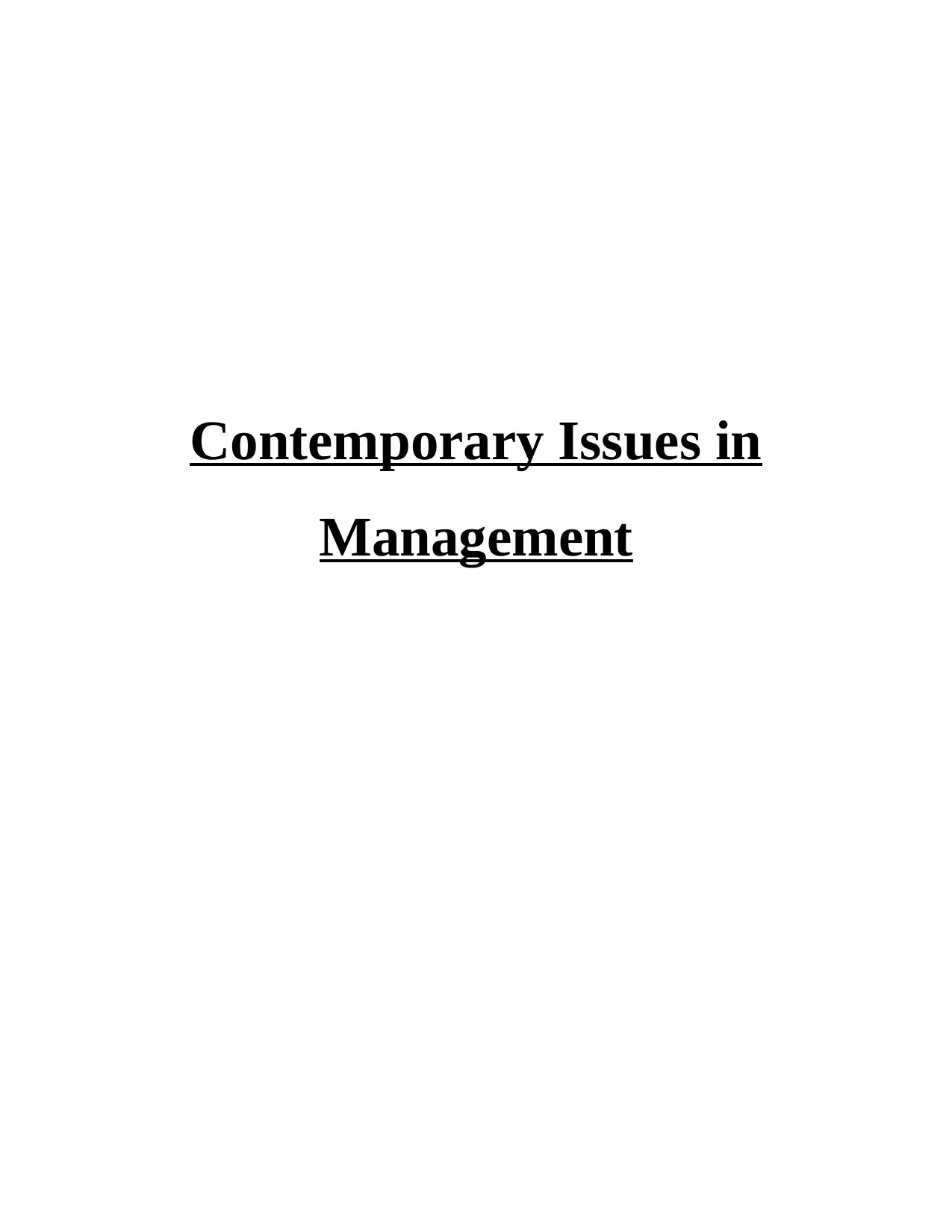
Contemporary Issues in
Management
Management
Paraphrase This Document
Need a fresh take? Get an instant paraphrase of this document with our AI Paraphraser
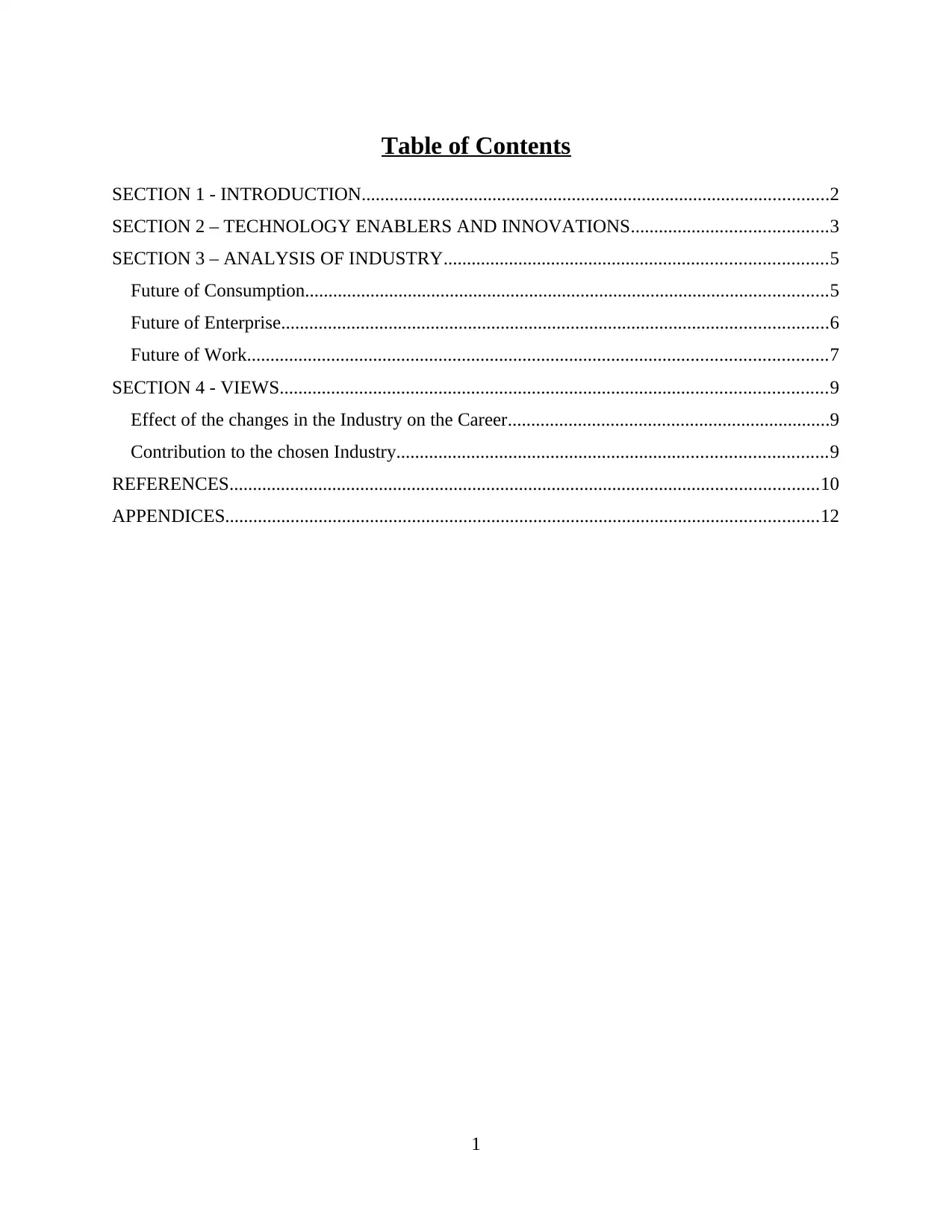
Table of Contents
SECTION 1 - INTRODUCTION....................................................................................................2
SECTION 2 – TECHNOLOGY ENABLERS AND INNOVATIONS..........................................3
SECTION 3 – ANALYSIS OF INDUSTRY..................................................................................5
Future of Consumption................................................................................................................5
Future of Enterprise.....................................................................................................................6
Future of Work............................................................................................................................7
SECTION 4 - VIEWS.....................................................................................................................9
Effect of the changes in the Industry on the Career.....................................................................9
Contribution to the chosen Industry............................................................................................9
REFERENCES..............................................................................................................................10
APPENDICES...............................................................................................................................12
1
SECTION 1 - INTRODUCTION....................................................................................................2
SECTION 2 – TECHNOLOGY ENABLERS AND INNOVATIONS..........................................3
SECTION 3 – ANALYSIS OF INDUSTRY..................................................................................5
Future of Consumption................................................................................................................5
Future of Enterprise.....................................................................................................................6
Future of Work............................................................................................................................7
SECTION 4 - VIEWS.....................................................................................................................9
Effect of the changes in the Industry on the Career.....................................................................9
Contribution to the chosen Industry............................................................................................9
REFERENCES..............................................................................................................................10
APPENDICES...............................................................................................................................12
1
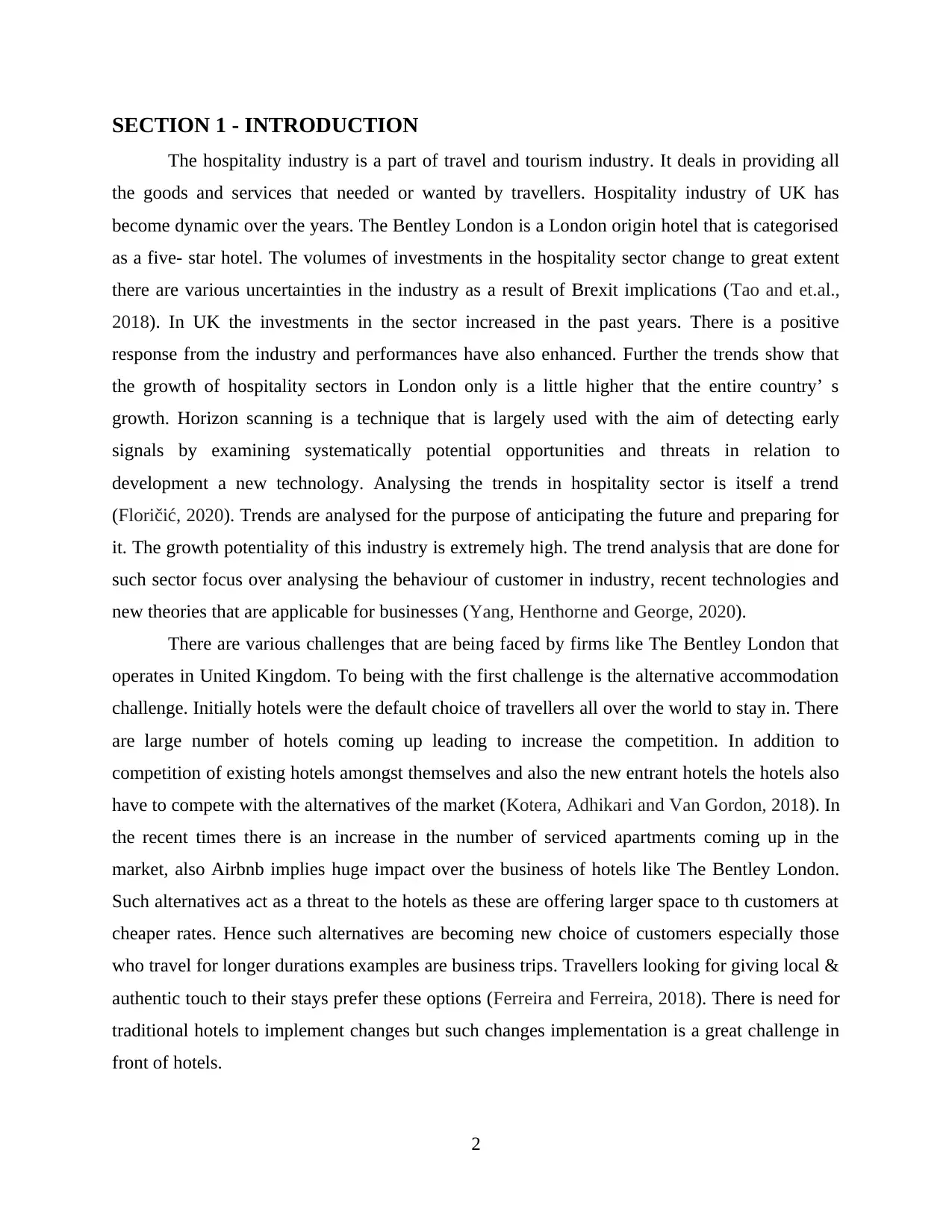
SECTION 1 - INTRODUCTION
The hospitality industry is a part of travel and tourism industry. It deals in providing all
the goods and services that needed or wanted by travellers. Hospitality industry of UK has
become dynamic over the years. The Bentley London is a London origin hotel that is categorised
as a five- star hotel. The volumes of investments in the hospitality sector change to great extent
there are various uncertainties in the industry as a result of Brexit implications (Tao and et.al.,
2018). In UK the investments in the sector increased in the past years. There is a positive
response from the industry and performances have also enhanced. Further the trends show that
the growth of hospitality sectors in London only is a little higher that the entire country’ s
growth. Horizon scanning is a technique that is largely used with the aim of detecting early
signals by examining systematically potential opportunities and threats in relation to
development a new technology. Analysing the trends in hospitality sector is itself a trend
(Floričić, 2020). Trends are analysed for the purpose of anticipating the future and preparing for
it. The growth potentiality of this industry is extremely high. The trend analysis that are done for
such sector focus over analysing the behaviour of customer in industry, recent technologies and
new theories that are applicable for businesses (Yang, Henthorne and George, 2020).
There are various challenges that are being faced by firms like The Bentley London that
operates in United Kingdom. To being with the first challenge is the alternative accommodation
challenge. Initially hotels were the default choice of travellers all over the world to stay in. There
are large number of hotels coming up leading to increase the competition. In addition to
competition of existing hotels amongst themselves and also the new entrant hotels the hotels also
have to compete with the alternatives of the market (Kotera, Adhikari and Van Gordon, 2018). In
the recent times there is an increase in the number of serviced apartments coming up in the
market, also Airbnb implies huge impact over the business of hotels like The Bentley London.
Such alternatives act as a threat to the hotels as these are offering larger space to th customers at
cheaper rates. Hence such alternatives are becoming new choice of customers especially those
who travel for longer durations examples are business trips. Travellers looking for giving local &
authentic touch to their stays prefer these options (Ferreira and Ferreira, 2018). There is need for
traditional hotels to implement changes but such changes implementation is a great challenge in
front of hotels.
2
The hospitality industry is a part of travel and tourism industry. It deals in providing all
the goods and services that needed or wanted by travellers. Hospitality industry of UK has
become dynamic over the years. The Bentley London is a London origin hotel that is categorised
as a five- star hotel. The volumes of investments in the hospitality sector change to great extent
there are various uncertainties in the industry as a result of Brexit implications (Tao and et.al.,
2018). In UK the investments in the sector increased in the past years. There is a positive
response from the industry and performances have also enhanced. Further the trends show that
the growth of hospitality sectors in London only is a little higher that the entire country’ s
growth. Horizon scanning is a technique that is largely used with the aim of detecting early
signals by examining systematically potential opportunities and threats in relation to
development a new technology. Analysing the trends in hospitality sector is itself a trend
(Floričić, 2020). Trends are analysed for the purpose of anticipating the future and preparing for
it. The growth potentiality of this industry is extremely high. The trend analysis that are done for
such sector focus over analysing the behaviour of customer in industry, recent technologies and
new theories that are applicable for businesses (Yang, Henthorne and George, 2020).
There are various challenges that are being faced by firms like The Bentley London that
operates in United Kingdom. To being with the first challenge is the alternative accommodation
challenge. Initially hotels were the default choice of travellers all over the world to stay in. There
are large number of hotels coming up leading to increase the competition. In addition to
competition of existing hotels amongst themselves and also the new entrant hotels the hotels also
have to compete with the alternatives of the market (Kotera, Adhikari and Van Gordon, 2018). In
the recent times there is an increase in the number of serviced apartments coming up in the
market, also Airbnb implies huge impact over the business of hotels like The Bentley London.
Such alternatives act as a threat to the hotels as these are offering larger space to th customers at
cheaper rates. Hence such alternatives are becoming new choice of customers especially those
who travel for longer durations examples are business trips. Travellers looking for giving local &
authentic touch to their stays prefer these options (Ferreira and Ferreira, 2018). There is need for
traditional hotels to implement changes but such changes implementation is a great challenge in
front of hotels.
2
⊘ This is a preview!⊘
Do you want full access?
Subscribe today to unlock all pages.

Trusted by 1+ million students worldwide
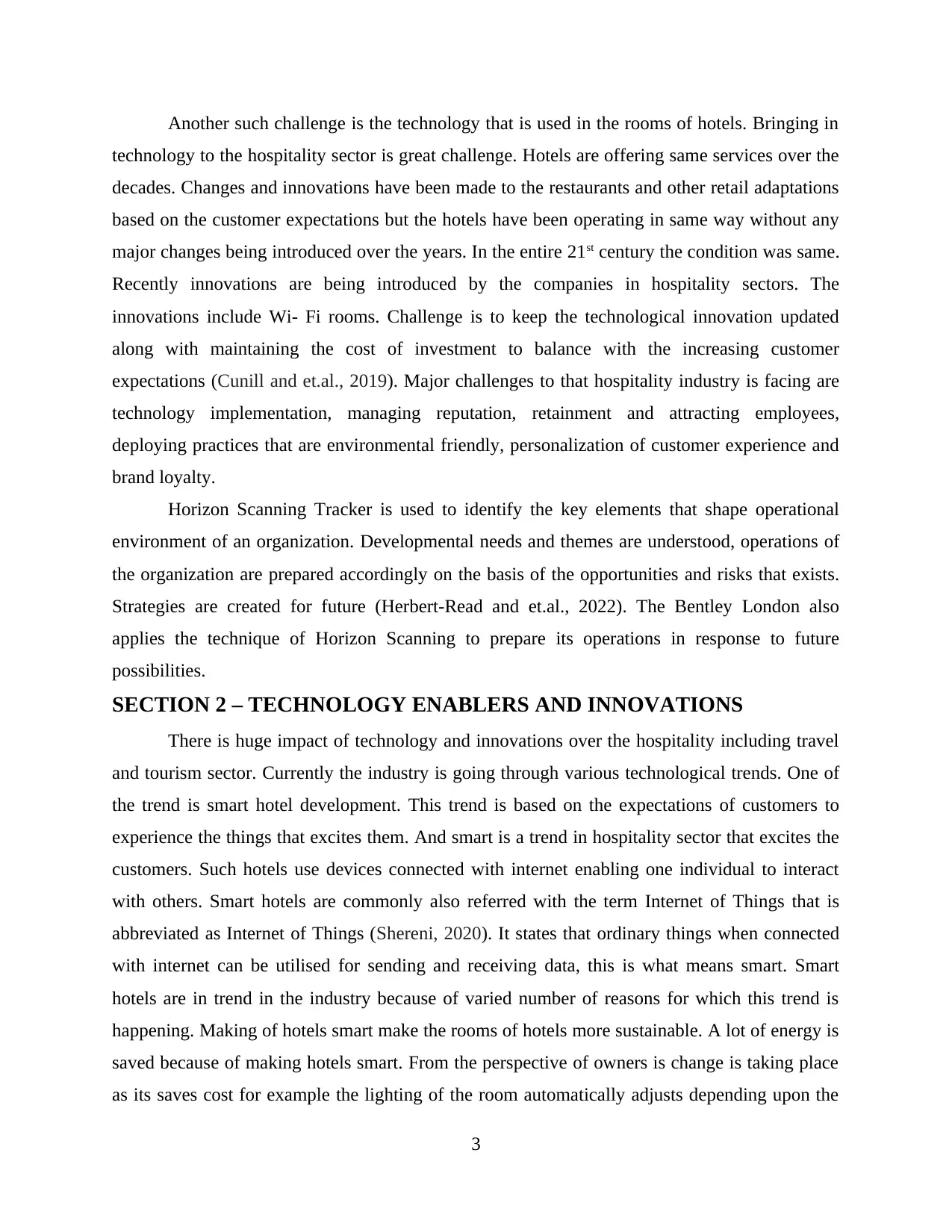
Another such challenge is the technology that is used in the rooms of hotels. Bringing in
technology to the hospitality sector is great challenge. Hotels are offering same services over the
decades. Changes and innovations have been made to the restaurants and other retail adaptations
based on the customer expectations but the hotels have been operating in same way without any
major changes being introduced over the years. In the entire 21st century the condition was same.
Recently innovations are being introduced by the companies in hospitality sectors. The
innovations include Wi- Fi rooms. Challenge is to keep the technological innovation updated
along with maintaining the cost of investment to balance with the increasing customer
expectations (Cunill and et.al., 2019). Major challenges to that hospitality industry is facing are
technology implementation, managing reputation, retainment and attracting employees,
deploying practices that are environmental friendly, personalization of customer experience and
brand loyalty.
Horizon Scanning Tracker is used to identify the key elements that shape operational
environment of an organization. Developmental needs and themes are understood, operations of
the organization are prepared accordingly on the basis of the opportunities and risks that exists.
Strategies are created for future (Herbert-Read and et.al., 2022). The Bentley London also
applies the technique of Horizon Scanning to prepare its operations in response to future
possibilities.
SECTION 2 – TECHNOLOGY ENABLERS AND INNOVATIONS
There is huge impact of technology and innovations over the hospitality including travel
and tourism sector. Currently the industry is going through various technological trends. One of
the trend is smart hotel development. This trend is based on the expectations of customers to
experience the things that excites them. And smart is a trend in hospitality sector that excites the
customers. Such hotels use devices connected with internet enabling one individual to interact
with others. Smart hotels are commonly also referred with the term Internet of Things that is
abbreviated as Internet of Things (Shereni, 2020). It states that ordinary things when connected
with internet can be utilised for sending and receiving data, this is what means smart. Smart
hotels are in trend in the industry because of varied number of reasons for which this trend is
happening. Making of hotels smart make the rooms of hotels more sustainable. A lot of energy is
saved because of making hotels smart. From the perspective of owners is change is taking place
as its saves cost for example the lighting of the room automatically adjusts depending upon the
3
technology to the hospitality sector is great challenge. Hotels are offering same services over the
decades. Changes and innovations have been made to the restaurants and other retail adaptations
based on the customer expectations but the hotels have been operating in same way without any
major changes being introduced over the years. In the entire 21st century the condition was same.
Recently innovations are being introduced by the companies in hospitality sectors. The
innovations include Wi- Fi rooms. Challenge is to keep the technological innovation updated
along with maintaining the cost of investment to balance with the increasing customer
expectations (Cunill and et.al., 2019). Major challenges to that hospitality industry is facing are
technology implementation, managing reputation, retainment and attracting employees,
deploying practices that are environmental friendly, personalization of customer experience and
brand loyalty.
Horizon Scanning Tracker is used to identify the key elements that shape operational
environment of an organization. Developmental needs and themes are understood, operations of
the organization are prepared accordingly on the basis of the opportunities and risks that exists.
Strategies are created for future (Herbert-Read and et.al., 2022). The Bentley London also
applies the technique of Horizon Scanning to prepare its operations in response to future
possibilities.
SECTION 2 – TECHNOLOGY ENABLERS AND INNOVATIONS
There is huge impact of technology and innovations over the hospitality including travel
and tourism sector. Currently the industry is going through various technological trends. One of
the trend is smart hotel development. This trend is based on the expectations of customers to
experience the things that excites them. And smart is a trend in hospitality sector that excites the
customers. Such hotels use devices connected with internet enabling one individual to interact
with others. Smart hotels are commonly also referred with the term Internet of Things that is
abbreviated as Internet of Things (Shereni, 2020). It states that ordinary things when connected
with internet can be utilised for sending and receiving data, this is what means smart. Smart
hotels are in trend in the industry because of varied number of reasons for which this trend is
happening. Making of hotels smart make the rooms of hotels more sustainable. A lot of energy is
saved because of making hotels smart. From the perspective of owners is change is taking place
as its saves cost for example the lighting of the room automatically adjusts depending upon the
3
Paraphrase This Document
Need a fresh take? Get an instant paraphrase of this document with our AI Paraphraser
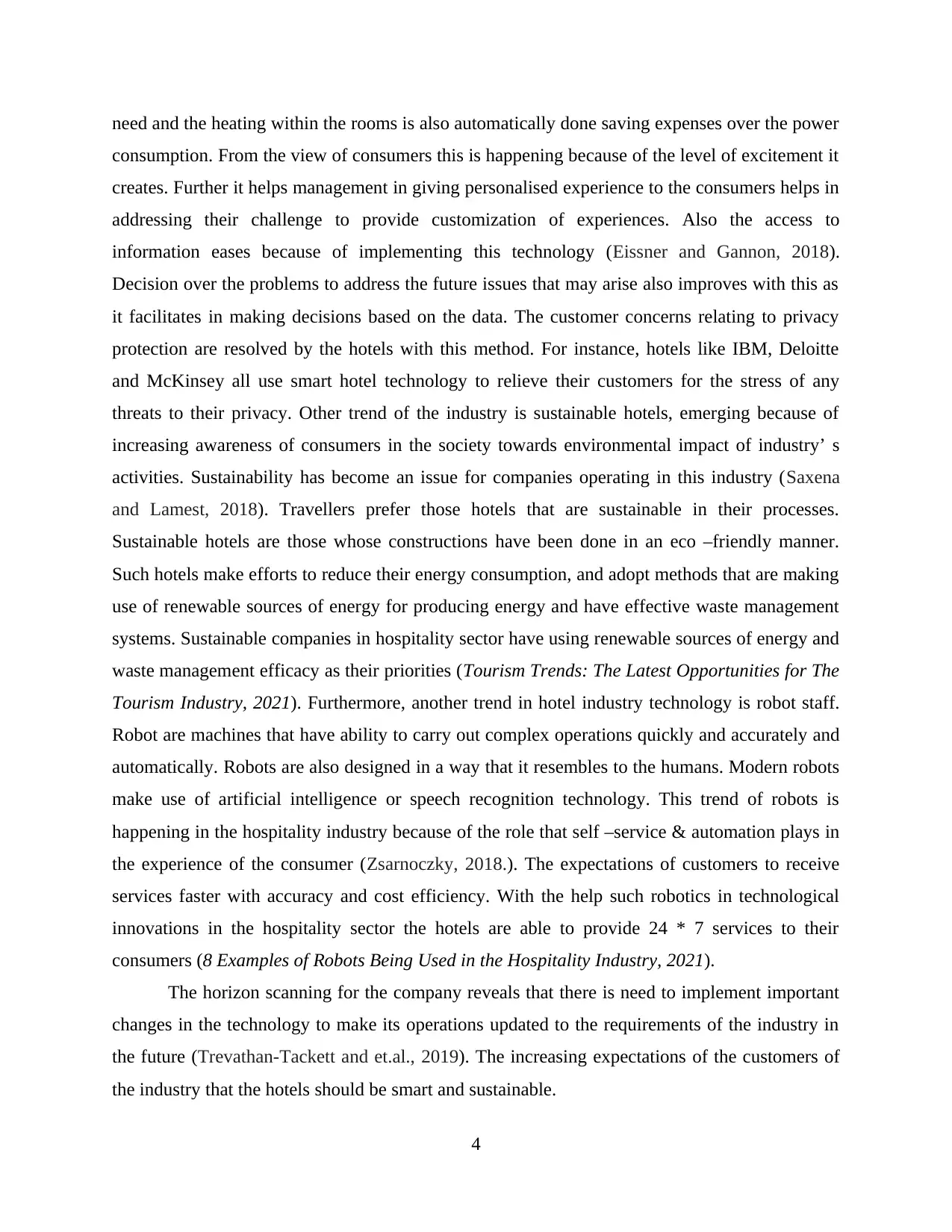
need and the heating within the rooms is also automatically done saving expenses over the power
consumption. From the view of consumers this is happening because of the level of excitement it
creates. Further it helps management in giving personalised experience to the consumers helps in
addressing their challenge to provide customization of experiences. Also the access to
information eases because of implementing this technology (Eissner and Gannon, 2018).
Decision over the problems to address the future issues that may arise also improves with this as
it facilitates in making decisions based on the data. The customer concerns relating to privacy
protection are resolved by the hotels with this method. For instance, hotels like IBM, Deloitte
and McKinsey all use smart hotel technology to relieve their customers for the stress of any
threats to their privacy. Other trend of the industry is sustainable hotels, emerging because of
increasing awareness of consumers in the society towards environmental impact of industry’ s
activities. Sustainability has become an issue for companies operating in this industry (Saxena
and Lamest, 2018). Travellers prefer those hotels that are sustainable in their processes.
Sustainable hotels are those whose constructions have been done in an eco –friendly manner.
Such hotels make efforts to reduce their energy consumption, and adopt methods that are making
use of renewable sources of energy for producing energy and have effective waste management
systems. Sustainable companies in hospitality sector have using renewable sources of energy and
waste management efficacy as their priorities (Tourism Trends: The Latest Opportunities for The
Tourism Industry, 2021). Furthermore, another trend in hotel industry technology is robot staff.
Robot are machines that have ability to carry out complex operations quickly and accurately and
automatically. Robots are also designed in a way that it resembles to the humans. Modern robots
make use of artificial intelligence or speech recognition technology. This trend of robots is
happening in the hospitality industry because of the role that self –service & automation plays in
the experience of the consumer (Zsarnoczky, 2018.). The expectations of customers to receive
services faster with accuracy and cost efficiency. With the help such robotics in technological
innovations in the hospitality sector the hotels are able to provide 24 * 7 services to their
consumers (8 Examples of Robots Being Used in the Hospitality Industry, 2021).
The horizon scanning for the company reveals that there is need to implement important
changes in the technology to make its operations updated to the requirements of the industry in
the future (Trevathan-Tackett and et.al., 2019). The increasing expectations of the customers of
the industry that the hotels should be smart and sustainable.
4
consumption. From the view of consumers this is happening because of the level of excitement it
creates. Further it helps management in giving personalised experience to the consumers helps in
addressing their challenge to provide customization of experiences. Also the access to
information eases because of implementing this technology (Eissner and Gannon, 2018).
Decision over the problems to address the future issues that may arise also improves with this as
it facilitates in making decisions based on the data. The customer concerns relating to privacy
protection are resolved by the hotels with this method. For instance, hotels like IBM, Deloitte
and McKinsey all use smart hotel technology to relieve their customers for the stress of any
threats to their privacy. Other trend of the industry is sustainable hotels, emerging because of
increasing awareness of consumers in the society towards environmental impact of industry’ s
activities. Sustainability has become an issue for companies operating in this industry (Saxena
and Lamest, 2018). Travellers prefer those hotels that are sustainable in their processes.
Sustainable hotels are those whose constructions have been done in an eco –friendly manner.
Such hotels make efforts to reduce their energy consumption, and adopt methods that are making
use of renewable sources of energy for producing energy and have effective waste management
systems. Sustainable companies in hospitality sector have using renewable sources of energy and
waste management efficacy as their priorities (Tourism Trends: The Latest Opportunities for The
Tourism Industry, 2021). Furthermore, another trend in hotel industry technology is robot staff.
Robot are machines that have ability to carry out complex operations quickly and accurately and
automatically. Robots are also designed in a way that it resembles to the humans. Modern robots
make use of artificial intelligence or speech recognition technology. This trend of robots is
happening in the hospitality industry because of the role that self –service & automation plays in
the experience of the consumer (Zsarnoczky, 2018.). The expectations of customers to receive
services faster with accuracy and cost efficiency. With the help such robotics in technological
innovations in the hospitality sector the hotels are able to provide 24 * 7 services to their
consumers (8 Examples of Robots Being Used in the Hospitality Industry, 2021).
The horizon scanning for the company reveals that there is need to implement important
changes in the technology to make its operations updated to the requirements of the industry in
the future (Trevathan-Tackett and et.al., 2019). The increasing expectations of the customers of
the industry that the hotels should be smart and sustainable.
4
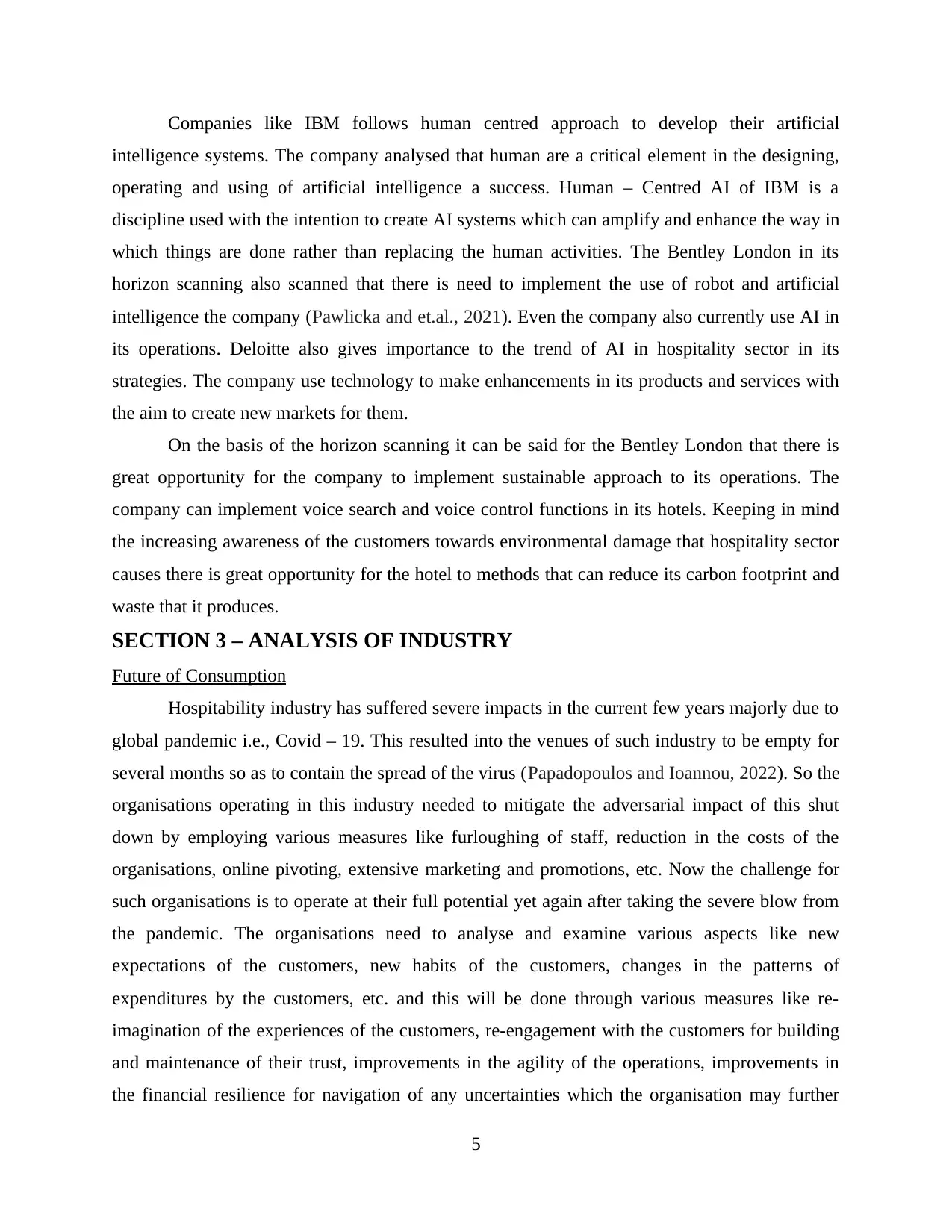
Companies like IBM follows human centred approach to develop their artificial
intelligence systems. The company analysed that human are a critical element in the designing,
operating and using of artificial intelligence a success. Human – Centred AI of IBM is a
discipline used with the intention to create AI systems which can amplify and enhance the way in
which things are done rather than replacing the human activities. The Bentley London in its
horizon scanning also scanned that there is need to implement the use of robot and artificial
intelligence the company (Pawlicka and et.al., 2021). Even the company also currently use AI in
its operations. Deloitte also gives importance to the trend of AI in hospitality sector in its
strategies. The company use technology to make enhancements in its products and services with
the aim to create new markets for them.
On the basis of the horizon scanning it can be said for the Bentley London that there is
great opportunity for the company to implement sustainable approach to its operations. The
company can implement voice search and voice control functions in its hotels. Keeping in mind
the increasing awareness of the customers towards environmental damage that hospitality sector
causes there is great opportunity for the hotel to methods that can reduce its carbon footprint and
waste that it produces.
SECTION 3 – ANALYSIS OF INDUSTRY
Future of Consumption
Hospitability industry has suffered severe impacts in the current few years majorly due to
global pandemic i.e., Covid – 19. This resulted into the venues of such industry to be empty for
several months so as to contain the spread of the virus (Papadopoulos and Ioannou, 2022). So the
organisations operating in this industry needed to mitigate the adversarial impact of this shut
down by employing various measures like furloughing of staff, reduction in the costs of the
organisations, online pivoting, extensive marketing and promotions, etc. Now the challenge for
such organisations is to operate at their full potential yet again after taking the severe blow from
the pandemic. The organisations need to analyse and examine various aspects like new
expectations of the customers, new habits of the customers, changes in the patterns of
expenditures by the customers, etc. and this will be done through various measures like re-
imagination of the experiences of the customers, re-engagement with the customers for building
and maintenance of their trust, improvements in the agility of the operations, improvements in
the financial resilience for navigation of any uncertainties which the organisation may further
5
intelligence systems. The company analysed that human are a critical element in the designing,
operating and using of artificial intelligence a success. Human – Centred AI of IBM is a
discipline used with the intention to create AI systems which can amplify and enhance the way in
which things are done rather than replacing the human activities. The Bentley London in its
horizon scanning also scanned that there is need to implement the use of robot and artificial
intelligence the company (Pawlicka and et.al., 2021). Even the company also currently use AI in
its operations. Deloitte also gives importance to the trend of AI in hospitality sector in its
strategies. The company use technology to make enhancements in its products and services with
the aim to create new markets for them.
On the basis of the horizon scanning it can be said for the Bentley London that there is
great opportunity for the company to implement sustainable approach to its operations. The
company can implement voice search and voice control functions in its hotels. Keeping in mind
the increasing awareness of the customers towards environmental damage that hospitality sector
causes there is great opportunity for the hotel to methods that can reduce its carbon footprint and
waste that it produces.
SECTION 3 – ANALYSIS OF INDUSTRY
Future of Consumption
Hospitability industry has suffered severe impacts in the current few years majorly due to
global pandemic i.e., Covid – 19. This resulted into the venues of such industry to be empty for
several months so as to contain the spread of the virus (Papadopoulos and Ioannou, 2022). So the
organisations operating in this industry needed to mitigate the adversarial impact of this shut
down by employing various measures like furloughing of staff, reduction in the costs of the
organisations, online pivoting, extensive marketing and promotions, etc. Now the challenge for
such organisations is to operate at their full potential yet again after taking the severe blow from
the pandemic. The organisations need to analyse and examine various aspects like new
expectations of the customers, new habits of the customers, changes in the patterns of
expenditures by the customers, etc. and this will be done through various measures like re-
imagination of the experiences of the customers, re-engagement with the customers for building
and maintenance of their trust, improvements in the agility of the operations, improvements in
the financial resilience for navigation of any uncertainties which the organisation may further
5
⊘ This is a preview!⊘
Do you want full access?
Subscribe today to unlock all pages.

Trusted by 1+ million students worldwide
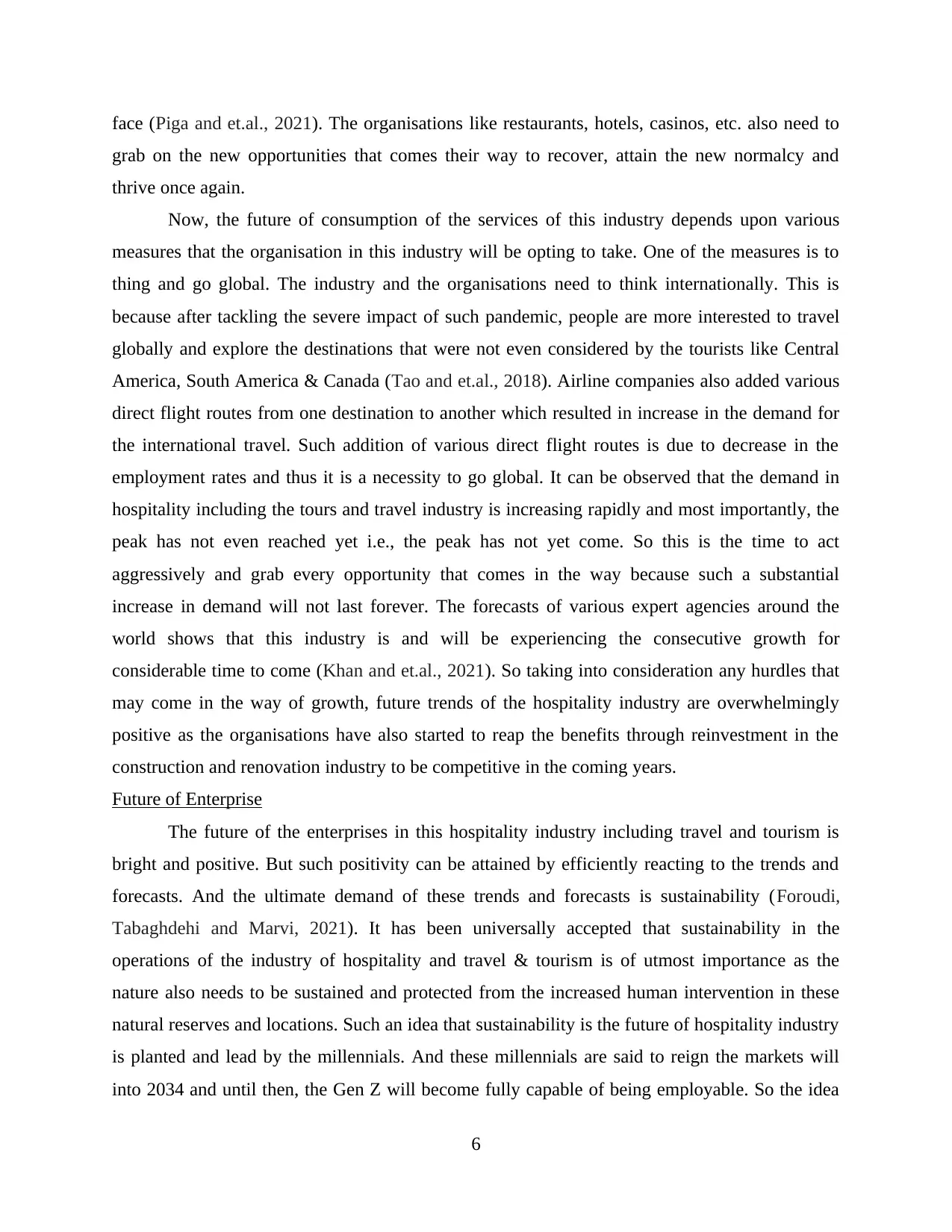
face (Piga and et.al., 2021). The organisations like restaurants, hotels, casinos, etc. also need to
grab on the new opportunities that comes their way to recover, attain the new normalcy and
thrive once again.
Now, the future of consumption of the services of this industry depends upon various
measures that the organisation in this industry will be opting to take. One of the measures is to
thing and go global. The industry and the organisations need to think internationally. This is
because after tackling the severe impact of such pandemic, people are more interested to travel
globally and explore the destinations that were not even considered by the tourists like Central
America, South America & Canada (Tao and et.al., 2018). Airline companies also added various
direct flight routes from one destination to another which resulted in increase in the demand for
the international travel. Such addition of various direct flight routes is due to decrease in the
employment rates and thus it is a necessity to go global. It can be observed that the demand in
hospitality including the tours and travel industry is increasing rapidly and most importantly, the
peak has not even reached yet i.e., the peak has not yet come. So this is the time to act
aggressively and grab every opportunity that comes in the way because such a substantial
increase in demand will not last forever. The forecasts of various expert agencies around the
world shows that this industry is and will be experiencing the consecutive growth for
considerable time to come (Khan and et.al., 2021). So taking into consideration any hurdles that
may come in the way of growth, future trends of the hospitality industry are overwhelmingly
positive as the organisations have also started to reap the benefits through reinvestment in the
construction and renovation industry to be competitive in the coming years.
Future of Enterprise
The future of the enterprises in this hospitality industry including travel and tourism is
bright and positive. But such positivity can be attained by efficiently reacting to the trends and
forecasts. And the ultimate demand of these trends and forecasts is sustainability (Foroudi,
Tabaghdehi and Marvi, 2021). It has been universally accepted that sustainability in the
operations of the industry of hospitality and travel & tourism is of utmost importance as the
nature also needs to be sustained and protected from the increased human intervention in these
natural reserves and locations. Such an idea that sustainability is the future of hospitality industry
is planted and lead by the millennials. And these millennials are said to reign the markets will
into 2034 and until then, the Gen Z will become fully capable of being employable. So the idea
6
grab on the new opportunities that comes their way to recover, attain the new normalcy and
thrive once again.
Now, the future of consumption of the services of this industry depends upon various
measures that the organisation in this industry will be opting to take. One of the measures is to
thing and go global. The industry and the organisations need to think internationally. This is
because after tackling the severe impact of such pandemic, people are more interested to travel
globally and explore the destinations that were not even considered by the tourists like Central
America, South America & Canada (Tao and et.al., 2018). Airline companies also added various
direct flight routes from one destination to another which resulted in increase in the demand for
the international travel. Such addition of various direct flight routes is due to decrease in the
employment rates and thus it is a necessity to go global. It can be observed that the demand in
hospitality including the tours and travel industry is increasing rapidly and most importantly, the
peak has not even reached yet i.e., the peak has not yet come. So this is the time to act
aggressively and grab every opportunity that comes in the way because such a substantial
increase in demand will not last forever. The forecasts of various expert agencies around the
world shows that this industry is and will be experiencing the consecutive growth for
considerable time to come (Khan and et.al., 2021). So taking into consideration any hurdles that
may come in the way of growth, future trends of the hospitality industry are overwhelmingly
positive as the organisations have also started to reap the benefits through reinvestment in the
construction and renovation industry to be competitive in the coming years.
Future of Enterprise
The future of the enterprises in this hospitality industry including travel and tourism is
bright and positive. But such positivity can be attained by efficiently reacting to the trends and
forecasts. And the ultimate demand of these trends and forecasts is sustainability (Foroudi,
Tabaghdehi and Marvi, 2021). It has been universally accepted that sustainability in the
operations of the industry of hospitality and travel & tourism is of utmost importance as the
nature also needs to be sustained and protected from the increased human intervention in these
natural reserves and locations. Such an idea that sustainability is the future of hospitality industry
is planted and lead by the millennials. And these millennials are said to reign the markets will
into 2034 and until then, the Gen Z will become fully capable of being employable. So the idea
6
Paraphrase This Document
Need a fresh take? Get an instant paraphrase of this document with our AI Paraphraser
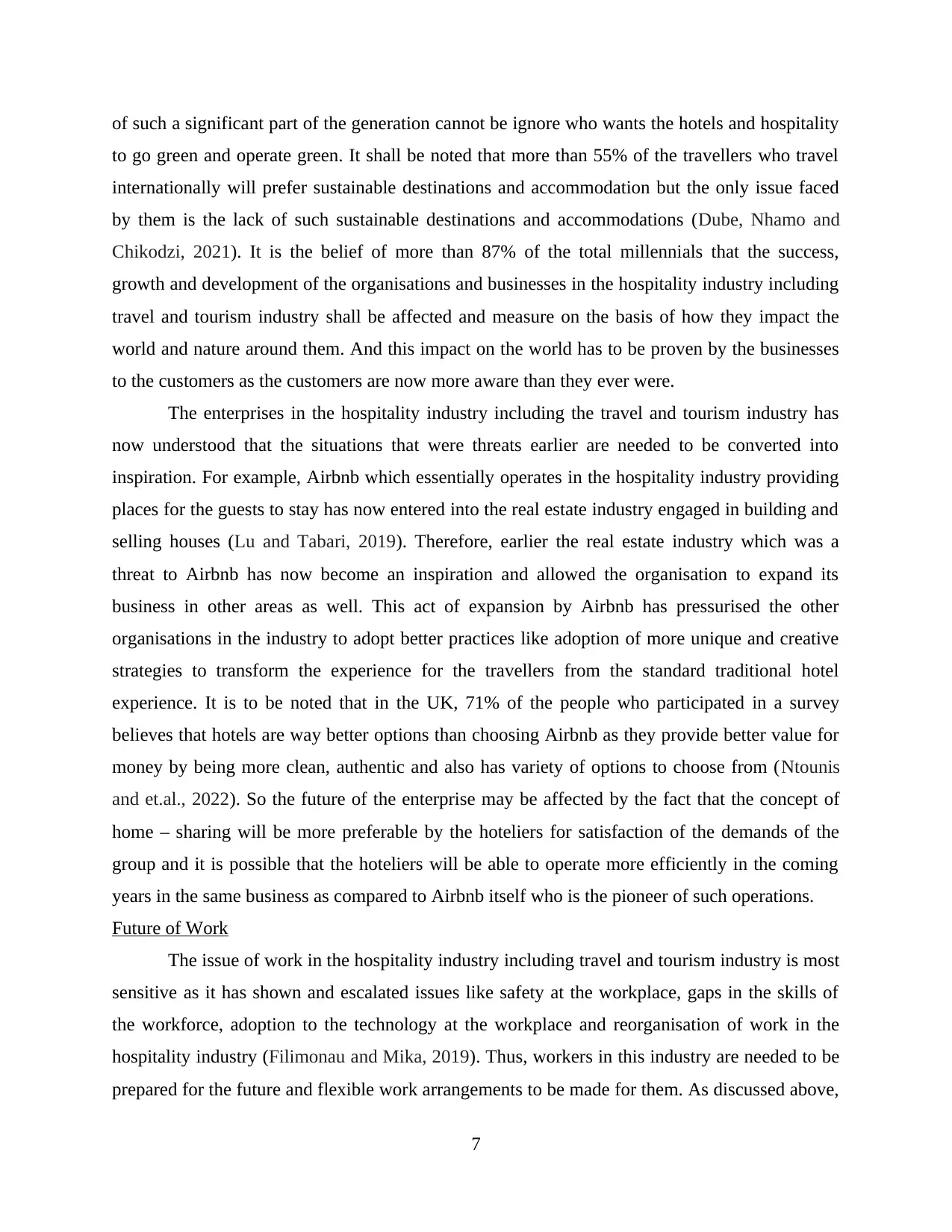
of such a significant part of the generation cannot be ignore who wants the hotels and hospitality
to go green and operate green. It shall be noted that more than 55% of the travellers who travel
internationally will prefer sustainable destinations and accommodation but the only issue faced
by them is the lack of such sustainable destinations and accommodations (Dube, Nhamo and
Chikodzi, 2021). It is the belief of more than 87% of the total millennials that the success,
growth and development of the organisations and businesses in the hospitality industry including
travel and tourism industry shall be affected and measure on the basis of how they impact the
world and nature around them. And this impact on the world has to be proven by the businesses
to the customers as the customers are now more aware than they ever were.
The enterprises in the hospitality industry including the travel and tourism industry has
now understood that the situations that were threats earlier are needed to be converted into
inspiration. For example, Airbnb which essentially operates in the hospitality industry providing
places for the guests to stay has now entered into the real estate industry engaged in building and
selling houses (Lu and Tabari, 2019). Therefore, earlier the real estate industry which was a
threat to Airbnb has now become an inspiration and allowed the organisation to expand its
business in other areas as well. This act of expansion by Airbnb has pressurised the other
organisations in the industry to adopt better practices like adoption of more unique and creative
strategies to transform the experience for the travellers from the standard traditional hotel
experience. It is to be noted that in the UK, 71% of the people who participated in a survey
believes that hotels are way better options than choosing Airbnb as they provide better value for
money by being more clean, authentic and also has variety of options to choose from (Ntounis
and et.al., 2022). So the future of the enterprise may be affected by the fact that the concept of
home – sharing will be more preferable by the hoteliers for satisfaction of the demands of the
group and it is possible that the hoteliers will be able to operate more efficiently in the coming
years in the same business as compared to Airbnb itself who is the pioneer of such operations.
Future of Work
The issue of work in the hospitality industry including travel and tourism industry is most
sensitive as it has shown and escalated issues like safety at the workplace, gaps in the skills of
the workforce, adoption to the technology at the workplace and reorganisation of work in the
hospitality industry (Filimonau and Mika, 2019). Thus, workers in this industry are needed to be
prepared for the future and flexible work arrangements to be made for them. As discussed above,
7
to go green and operate green. It shall be noted that more than 55% of the travellers who travel
internationally will prefer sustainable destinations and accommodation but the only issue faced
by them is the lack of such sustainable destinations and accommodations (Dube, Nhamo and
Chikodzi, 2021). It is the belief of more than 87% of the total millennials that the success,
growth and development of the organisations and businesses in the hospitality industry including
travel and tourism industry shall be affected and measure on the basis of how they impact the
world and nature around them. And this impact on the world has to be proven by the businesses
to the customers as the customers are now more aware than they ever were.
The enterprises in the hospitality industry including the travel and tourism industry has
now understood that the situations that were threats earlier are needed to be converted into
inspiration. For example, Airbnb which essentially operates in the hospitality industry providing
places for the guests to stay has now entered into the real estate industry engaged in building and
selling houses (Lu and Tabari, 2019). Therefore, earlier the real estate industry which was a
threat to Airbnb has now become an inspiration and allowed the organisation to expand its
business in other areas as well. This act of expansion by Airbnb has pressurised the other
organisations in the industry to adopt better practices like adoption of more unique and creative
strategies to transform the experience for the travellers from the standard traditional hotel
experience. It is to be noted that in the UK, 71% of the people who participated in a survey
believes that hotels are way better options than choosing Airbnb as they provide better value for
money by being more clean, authentic and also has variety of options to choose from (Ntounis
and et.al., 2022). So the future of the enterprise may be affected by the fact that the concept of
home – sharing will be more preferable by the hoteliers for satisfaction of the demands of the
group and it is possible that the hoteliers will be able to operate more efficiently in the coming
years in the same business as compared to Airbnb itself who is the pioneer of such operations.
Future of Work
The issue of work in the hospitality industry including travel and tourism industry is most
sensitive as it has shown and escalated issues like safety at the workplace, gaps in the skills of
the workforce, adoption to the technology at the workplace and reorganisation of work in the
hospitality industry (Filimonau and Mika, 2019). Thus, workers in this industry are needed to be
prepared for the future and flexible work arrangements to be made for them. As discussed above,
7
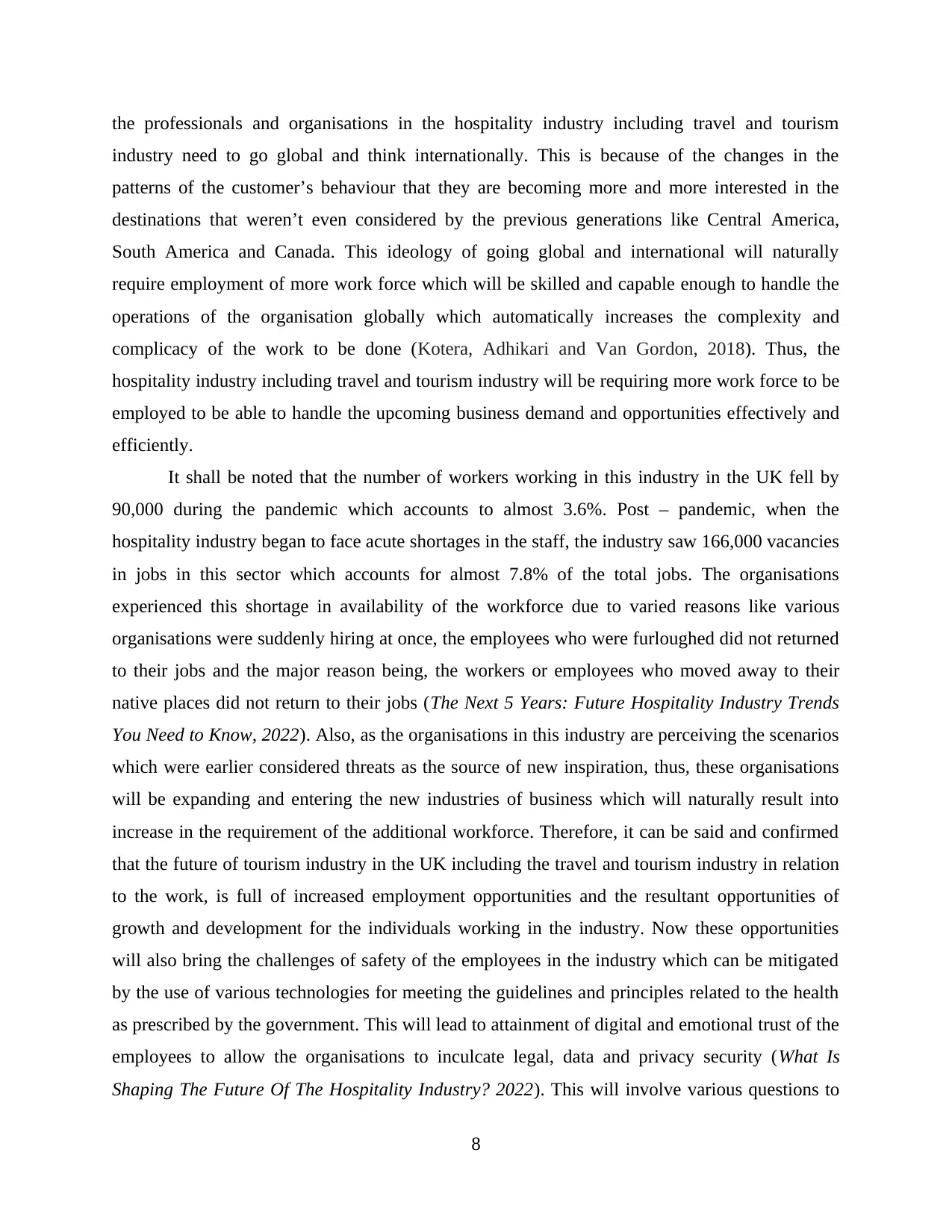
the professionals and organisations in the hospitality industry including travel and tourism
industry need to go global and think internationally. This is because of the changes in the
patterns of the customer’s behaviour that they are becoming more and more interested in the
destinations that weren’t even considered by the previous generations like Central America,
South America and Canada. This ideology of going global and international will naturally
require employment of more work force which will be skilled and capable enough to handle the
operations of the organisation globally which automatically increases the complexity and
complicacy of the work to be done (Kotera, Adhikari and Van Gordon, 2018). Thus, the
hospitality industry including travel and tourism industry will be requiring more work force to be
employed to be able to handle the upcoming business demand and opportunities effectively and
efficiently.
It shall be noted that the number of workers working in this industry in the UK fell by
90,000 during the pandemic which accounts to almost 3.6%. Post – pandemic, when the
hospitality industry began to face acute shortages in the staff, the industry saw 166,000 vacancies
in jobs in this sector which accounts for almost 7.8% of the total jobs. The organisations
experienced this shortage in availability of the workforce due to varied reasons like various
organisations were suddenly hiring at once, the employees who were furloughed did not returned
to their jobs and the major reason being, the workers or employees who moved away to their
native places did not return to their jobs (The Next 5 Years: Future Hospitality Industry Trends
You Need to Know, 2022). Also, as the organisations in this industry are perceiving the scenarios
which were earlier considered threats as the source of new inspiration, thus, these organisations
will be expanding and entering the new industries of business which will naturally result into
increase in the requirement of the additional workforce. Therefore, it can be said and confirmed
that the future of tourism industry in the UK including the travel and tourism industry in relation
to the work, is full of increased employment opportunities and the resultant opportunities of
growth and development for the individuals working in the industry. Now these opportunities
will also bring the challenges of safety of the employees in the industry which can be mitigated
by the use of various technologies for meeting the guidelines and principles related to the health
as prescribed by the government. This will lead to attainment of digital and emotional trust of the
employees to allow the organisations to inculcate legal, data and privacy security (What Is
Shaping The Future Of The Hospitality Industry? 2022). This will involve various questions to
8
industry need to go global and think internationally. This is because of the changes in the
patterns of the customer’s behaviour that they are becoming more and more interested in the
destinations that weren’t even considered by the previous generations like Central America,
South America and Canada. This ideology of going global and international will naturally
require employment of more work force which will be skilled and capable enough to handle the
operations of the organisation globally which automatically increases the complexity and
complicacy of the work to be done (Kotera, Adhikari and Van Gordon, 2018). Thus, the
hospitality industry including travel and tourism industry will be requiring more work force to be
employed to be able to handle the upcoming business demand and opportunities effectively and
efficiently.
It shall be noted that the number of workers working in this industry in the UK fell by
90,000 during the pandemic which accounts to almost 3.6%. Post – pandemic, when the
hospitality industry began to face acute shortages in the staff, the industry saw 166,000 vacancies
in jobs in this sector which accounts for almost 7.8% of the total jobs. The organisations
experienced this shortage in availability of the workforce due to varied reasons like various
organisations were suddenly hiring at once, the employees who were furloughed did not returned
to their jobs and the major reason being, the workers or employees who moved away to their
native places did not return to their jobs (The Next 5 Years: Future Hospitality Industry Trends
You Need to Know, 2022). Also, as the organisations in this industry are perceiving the scenarios
which were earlier considered threats as the source of new inspiration, thus, these organisations
will be expanding and entering the new industries of business which will naturally result into
increase in the requirement of the additional workforce. Therefore, it can be said and confirmed
that the future of tourism industry in the UK including the travel and tourism industry in relation
to the work, is full of increased employment opportunities and the resultant opportunities of
growth and development for the individuals working in the industry. Now these opportunities
will also bring the challenges of safety of the employees in the industry which can be mitigated
by the use of various technologies for meeting the guidelines and principles related to the health
as prescribed by the government. This will lead to attainment of digital and emotional trust of the
employees to allow the organisations to inculcate legal, data and privacy security (What Is
Shaping The Future Of The Hospitality Industry? 2022). This will involve various questions to
8
⊘ This is a preview!⊘
Do you want full access?
Subscribe today to unlock all pages.

Trusted by 1+ million students worldwide
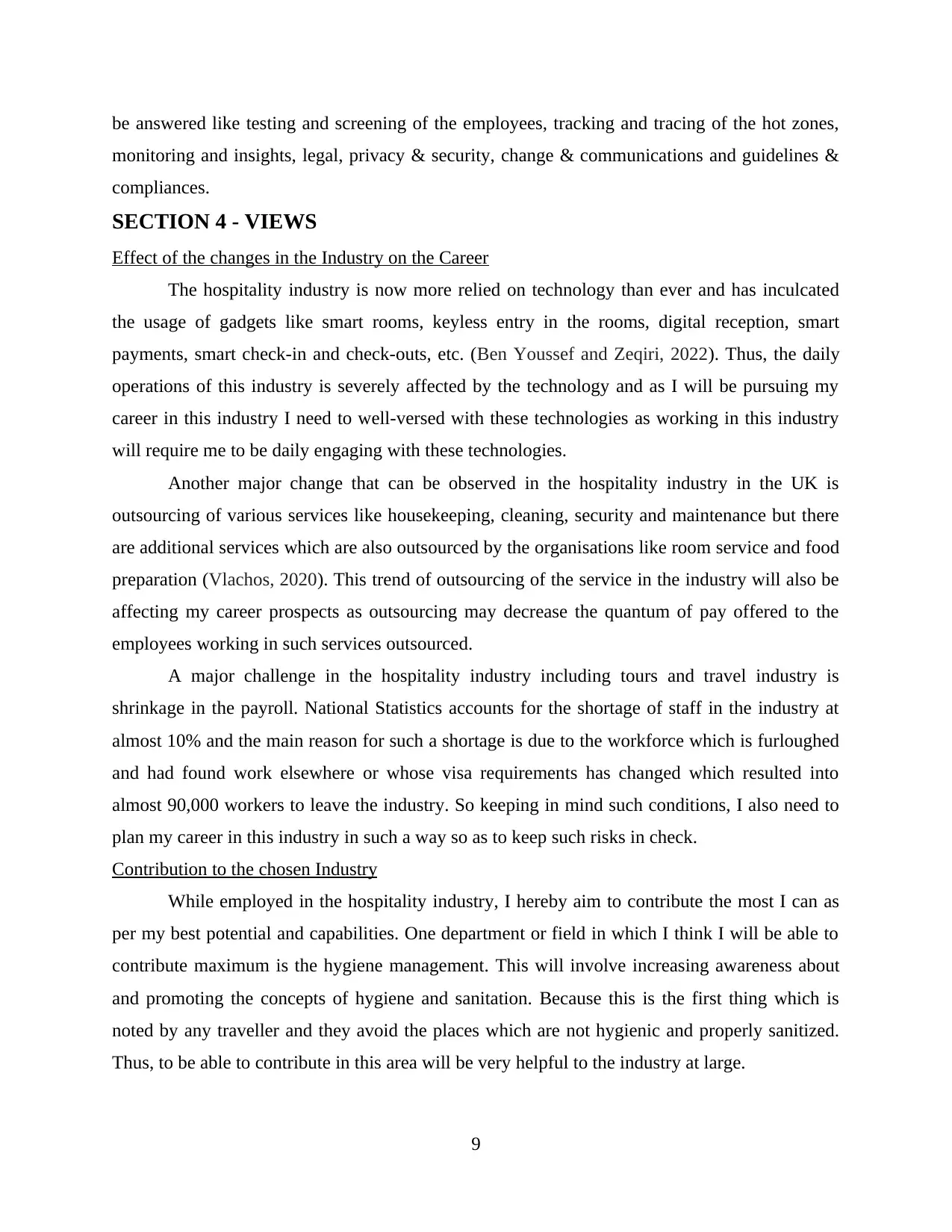
be answered like testing and screening of the employees, tracking and tracing of the hot zones,
monitoring and insights, legal, privacy & security, change & communications and guidelines &
compliances.
SECTION 4 - VIEWS
Effect of the changes in the Industry on the Career
The hospitality industry is now more relied on technology than ever and has inculcated
the usage of gadgets like smart rooms, keyless entry in the rooms, digital reception, smart
payments, smart check-in and check-outs, etc. (Ben Youssef and Zeqiri, 2022). Thus, the daily
operations of this industry is severely affected by the technology and as I will be pursuing my
career in this industry I need to well-versed with these technologies as working in this industry
will require me to be daily engaging with these technologies.
Another major change that can be observed in the hospitality industry in the UK is
outsourcing of various services like housekeeping, cleaning, security and maintenance but there
are additional services which are also outsourced by the organisations like room service and food
preparation (Vlachos, 2020). This trend of outsourcing of the service in the industry will also be
affecting my career prospects as outsourcing may decrease the quantum of pay offered to the
employees working in such services outsourced.
A major challenge in the hospitality industry including tours and travel industry is
shrinkage in the payroll. National Statistics accounts for the shortage of staff in the industry at
almost 10% and the main reason for such a shortage is due to the workforce which is furloughed
and had found work elsewhere or whose visa requirements has changed which resulted into
almost 90,000 workers to leave the industry. So keeping in mind such conditions, I also need to
plan my career in this industry in such a way so as to keep such risks in check.
Contribution to the chosen Industry
While employed in the hospitality industry, I hereby aim to contribute the most I can as
per my best potential and capabilities. One department or field in which I think I will be able to
contribute maximum is the hygiene management. This will involve increasing awareness about
and promoting the concepts of hygiene and sanitation. Because this is the first thing which is
noted by any traveller and they avoid the places which are not hygienic and properly sanitized.
Thus, to be able to contribute in this area will be very helpful to the industry at large.
9
monitoring and insights, legal, privacy & security, change & communications and guidelines &
compliances.
SECTION 4 - VIEWS
Effect of the changes in the Industry on the Career
The hospitality industry is now more relied on technology than ever and has inculcated
the usage of gadgets like smart rooms, keyless entry in the rooms, digital reception, smart
payments, smart check-in and check-outs, etc. (Ben Youssef and Zeqiri, 2022). Thus, the daily
operations of this industry is severely affected by the technology and as I will be pursuing my
career in this industry I need to well-versed with these technologies as working in this industry
will require me to be daily engaging with these technologies.
Another major change that can be observed in the hospitality industry in the UK is
outsourcing of various services like housekeeping, cleaning, security and maintenance but there
are additional services which are also outsourced by the organisations like room service and food
preparation (Vlachos, 2020). This trend of outsourcing of the service in the industry will also be
affecting my career prospects as outsourcing may decrease the quantum of pay offered to the
employees working in such services outsourced.
A major challenge in the hospitality industry including tours and travel industry is
shrinkage in the payroll. National Statistics accounts for the shortage of staff in the industry at
almost 10% and the main reason for such a shortage is due to the workforce which is furloughed
and had found work elsewhere or whose visa requirements has changed which resulted into
almost 90,000 workers to leave the industry. So keeping in mind such conditions, I also need to
plan my career in this industry in such a way so as to keep such risks in check.
Contribution to the chosen Industry
While employed in the hospitality industry, I hereby aim to contribute the most I can as
per my best potential and capabilities. One department or field in which I think I will be able to
contribute maximum is the hygiene management. This will involve increasing awareness about
and promoting the concepts of hygiene and sanitation. Because this is the first thing which is
noted by any traveller and they avoid the places which are not hygienic and properly sanitized.
Thus, to be able to contribute in this area will be very helpful to the industry at large.
9
Paraphrase This Document
Need a fresh take? Get an instant paraphrase of this document with our AI Paraphraser
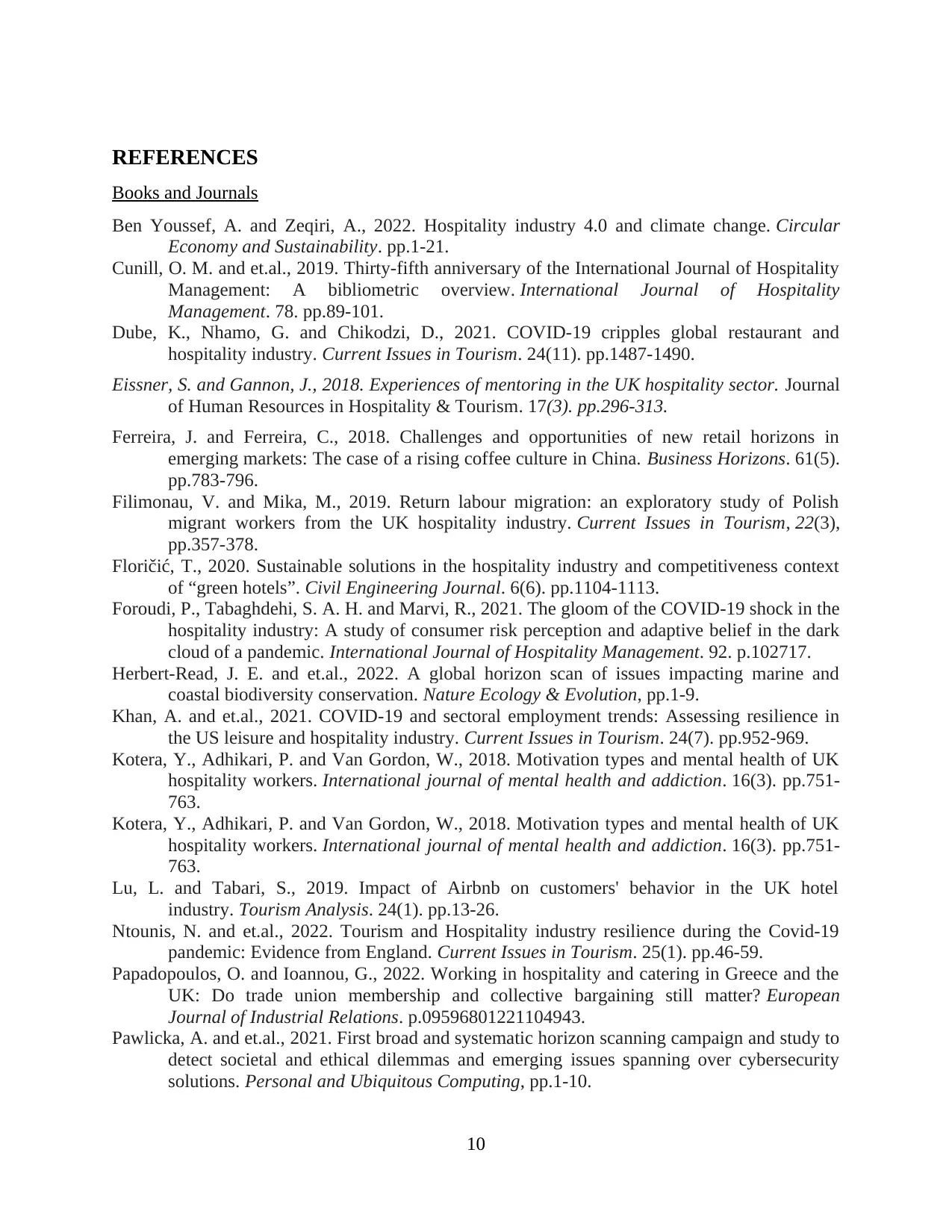
REFERENCES
Books and Journals
Ben Youssef, A. and Zeqiri, A., 2022. Hospitality industry 4.0 and climate change. Circular
Economy and Sustainability. pp.1-21.
Cunill, O. M. and et.al., 2019. Thirty-fifth anniversary of the International Journal of Hospitality
Management: A bibliometric overview. International Journal of Hospitality
Management. 78. pp.89-101.
Dube, K., Nhamo, G. and Chikodzi, D., 2021. COVID-19 cripples global restaurant and
hospitality industry. Current Issues in Tourism. 24(11). pp.1487-1490.
Eissner, S. and Gannon, J., 2018. Experiences of mentoring in the UK hospitality sector. Journal
of Human Resources in Hospitality & Tourism. 17(3). pp.296-313.
Ferreira, J. and Ferreira, C., 2018. Challenges and opportunities of new retail horizons in
emerging markets: The case of a rising coffee culture in China. Business Horizons. 61(5).
pp.783-796.
Filimonau, V. and Mika, M., 2019. Return labour migration: an exploratory study of Polish
migrant workers from the UK hospitality industry. Current Issues in Tourism, 22(3),
pp.357-378.
Floričić, T., 2020. Sustainable solutions in the hospitality industry and competitiveness context
of “green hotels”. Civil Engineering Journal. 6(6). pp.1104-1113.
Foroudi, P., Tabaghdehi, S. A. H. and Marvi, R., 2021. The gloom of the COVID-19 shock in the
hospitality industry: A study of consumer risk perception and adaptive belief in the dark
cloud of a pandemic. International Journal of Hospitality Management. 92. p.102717.
Herbert-Read, J. E. and et.al., 2022. A global horizon scan of issues impacting marine and
coastal biodiversity conservation. Nature Ecology & Evolution, pp.1-9.
Khan, A. and et.al., 2021. COVID-19 and sectoral employment trends: Assessing resilience in
the US leisure and hospitality industry. Current Issues in Tourism. 24(7). pp.952-969.
Kotera, Y., Adhikari, P. and Van Gordon, W., 2018. Motivation types and mental health of UK
hospitality workers. International journal of mental health and addiction. 16(3). pp.751-
763.
Kotera, Y., Adhikari, P. and Van Gordon, W., 2018. Motivation types and mental health of UK
hospitality workers. International journal of mental health and addiction. 16(3). pp.751-
763.
Lu, L. and Tabari, S., 2019. Impact of Airbnb on customers' behavior in the UK hotel
industry. Tourism Analysis. 24(1). pp.13-26.
Ntounis, N. and et.al., 2022. Tourism and Hospitality industry resilience during the Covid-19
pandemic: Evidence from England. Current Issues in Tourism. 25(1). pp.46-59.
Papadopoulos, O. and Ioannou, G., 2022. Working in hospitality and catering in Greece and the
UK: Do trade union membership and collective bargaining still matter? European
Journal of Industrial Relations. p.09596801221104943.
Pawlicka, A. and et.al., 2021. First broad and systematic horizon scanning campaign and study to
detect societal and ethical dilemmas and emerging issues spanning over cybersecurity
solutions. Personal and Ubiquitous Computing, pp.1-10.
10
Books and Journals
Ben Youssef, A. and Zeqiri, A., 2022. Hospitality industry 4.0 and climate change. Circular
Economy and Sustainability. pp.1-21.
Cunill, O. M. and et.al., 2019. Thirty-fifth anniversary of the International Journal of Hospitality
Management: A bibliometric overview. International Journal of Hospitality
Management. 78. pp.89-101.
Dube, K., Nhamo, G. and Chikodzi, D., 2021. COVID-19 cripples global restaurant and
hospitality industry. Current Issues in Tourism. 24(11). pp.1487-1490.
Eissner, S. and Gannon, J., 2018. Experiences of mentoring in the UK hospitality sector. Journal
of Human Resources in Hospitality & Tourism. 17(3). pp.296-313.
Ferreira, J. and Ferreira, C., 2018. Challenges and opportunities of new retail horizons in
emerging markets: The case of a rising coffee culture in China. Business Horizons. 61(5).
pp.783-796.
Filimonau, V. and Mika, M., 2019. Return labour migration: an exploratory study of Polish
migrant workers from the UK hospitality industry. Current Issues in Tourism, 22(3),
pp.357-378.
Floričić, T., 2020. Sustainable solutions in the hospitality industry and competitiveness context
of “green hotels”. Civil Engineering Journal. 6(6). pp.1104-1113.
Foroudi, P., Tabaghdehi, S. A. H. and Marvi, R., 2021. The gloom of the COVID-19 shock in the
hospitality industry: A study of consumer risk perception and adaptive belief in the dark
cloud of a pandemic. International Journal of Hospitality Management. 92. p.102717.
Herbert-Read, J. E. and et.al., 2022. A global horizon scan of issues impacting marine and
coastal biodiversity conservation. Nature Ecology & Evolution, pp.1-9.
Khan, A. and et.al., 2021. COVID-19 and sectoral employment trends: Assessing resilience in
the US leisure and hospitality industry. Current Issues in Tourism. 24(7). pp.952-969.
Kotera, Y., Adhikari, P. and Van Gordon, W., 2018. Motivation types and mental health of UK
hospitality workers. International journal of mental health and addiction. 16(3). pp.751-
763.
Kotera, Y., Adhikari, P. and Van Gordon, W., 2018. Motivation types and mental health of UK
hospitality workers. International journal of mental health and addiction. 16(3). pp.751-
763.
Lu, L. and Tabari, S., 2019. Impact of Airbnb on customers' behavior in the UK hotel
industry. Tourism Analysis. 24(1). pp.13-26.
Ntounis, N. and et.al., 2022. Tourism and Hospitality industry resilience during the Covid-19
pandemic: Evidence from England. Current Issues in Tourism. 25(1). pp.46-59.
Papadopoulos, O. and Ioannou, G., 2022. Working in hospitality and catering in Greece and the
UK: Do trade union membership and collective bargaining still matter? European
Journal of Industrial Relations. p.09596801221104943.
Pawlicka, A. and et.al., 2021. First broad and systematic horizon scanning campaign and study to
detect societal and ethical dilemmas and emerging issues spanning over cybersecurity
solutions. Personal and Ubiquitous Computing, pp.1-10.
10
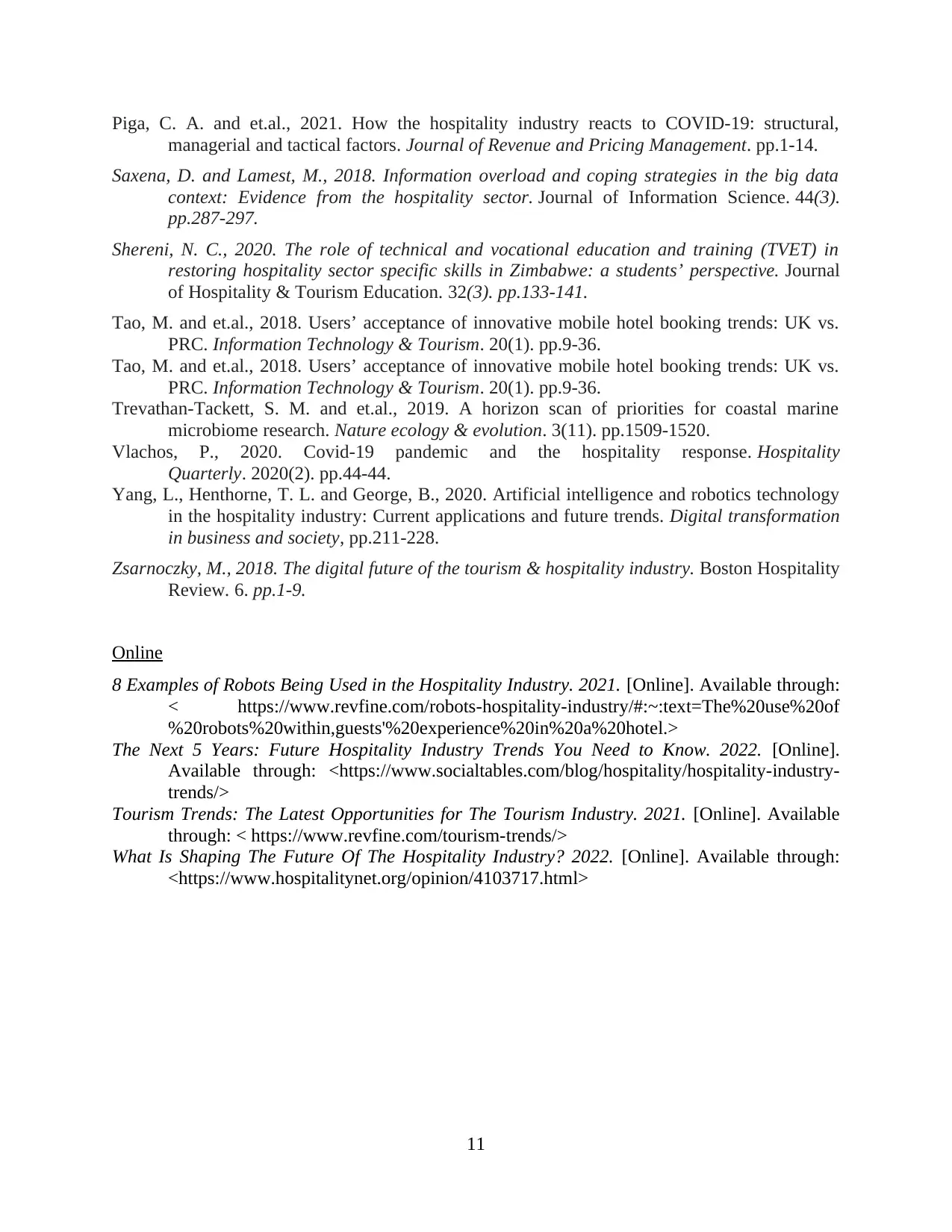
Piga, C. A. and et.al., 2021. How the hospitality industry reacts to COVID-19: structural,
managerial and tactical factors. Journal of Revenue and Pricing Management. pp.1-14.
Saxena, D. and Lamest, M., 2018. Information overload and coping strategies in the big data
context: Evidence from the hospitality sector. Journal of Information Science. 44(3).
pp.287-297.
Shereni, N. C., 2020. The role of technical and vocational education and training (TVET) in
restoring hospitality sector specific skills in Zimbabwe: a students’ perspective. Journal
of Hospitality & Tourism Education. 32(3). pp.133-141.
Tao, M. and et.al., 2018. Users’ acceptance of innovative mobile hotel booking trends: UK vs.
PRC. Information Technology & Tourism. 20(1). pp.9-36.
Tao, M. and et.al., 2018. Users’ acceptance of innovative mobile hotel booking trends: UK vs.
PRC. Information Technology & Tourism. 20(1). pp.9-36.
Trevathan-Tackett, S. M. and et.al., 2019. A horizon scan of priorities for coastal marine
microbiome research. Nature ecology & evolution. 3(11). pp.1509-1520.
Vlachos, P., 2020. Covid-19 pandemic and the hospitality response. Hospitality
Quarterly. 2020(2). pp.44-44.
Yang, L., Henthorne, T. L. and George, B., 2020. Artificial intelligence and robotics technology
in the hospitality industry: Current applications and future trends. Digital transformation
in business and society, pp.211-228.
Zsarnoczky, M., 2018. The digital future of the tourism & hospitality industry. Boston Hospitality
Review. 6. pp.1-9.
Online
8 Examples of Robots Being Used in the Hospitality Industry. 2021. [Online]. Available through:
< https://www.revfine.com/robots-hospitality-industry/#:~:text=The%20use%20of
%20robots%20within,guests'%20experience%20in%20a%20hotel.>
The Next 5 Years: Future Hospitality Industry Trends You Need to Know. 2022. [Online].
Available through: <https://www.socialtables.com/blog/hospitality/hospitality-industry-
trends/>
Tourism Trends: The Latest Opportunities for The Tourism Industry. 2021. [Online]. Available
through: < https://www.revfine.com/tourism-trends/>
What Is Shaping The Future Of The Hospitality Industry? 2022. [Online]. Available through:
<https://www.hospitalitynet.org/opinion/4103717.html>
11
managerial and tactical factors. Journal of Revenue and Pricing Management. pp.1-14.
Saxena, D. and Lamest, M., 2018. Information overload and coping strategies in the big data
context: Evidence from the hospitality sector. Journal of Information Science. 44(3).
pp.287-297.
Shereni, N. C., 2020. The role of technical and vocational education and training (TVET) in
restoring hospitality sector specific skills in Zimbabwe: a students’ perspective. Journal
of Hospitality & Tourism Education. 32(3). pp.133-141.
Tao, M. and et.al., 2018. Users’ acceptance of innovative mobile hotel booking trends: UK vs.
PRC. Information Technology & Tourism. 20(1). pp.9-36.
Tao, M. and et.al., 2018. Users’ acceptance of innovative mobile hotel booking trends: UK vs.
PRC. Information Technology & Tourism. 20(1). pp.9-36.
Trevathan-Tackett, S. M. and et.al., 2019. A horizon scan of priorities for coastal marine
microbiome research. Nature ecology & evolution. 3(11). pp.1509-1520.
Vlachos, P., 2020. Covid-19 pandemic and the hospitality response. Hospitality
Quarterly. 2020(2). pp.44-44.
Yang, L., Henthorne, T. L. and George, B., 2020. Artificial intelligence and robotics technology
in the hospitality industry: Current applications and future trends. Digital transformation
in business and society, pp.211-228.
Zsarnoczky, M., 2018. The digital future of the tourism & hospitality industry. Boston Hospitality
Review. 6. pp.1-9.
Online
8 Examples of Robots Being Used in the Hospitality Industry. 2021. [Online]. Available through:
< https://www.revfine.com/robots-hospitality-industry/#:~:text=The%20use%20of
%20robots%20within,guests'%20experience%20in%20a%20hotel.>
The Next 5 Years: Future Hospitality Industry Trends You Need to Know. 2022. [Online].
Available through: <https://www.socialtables.com/blog/hospitality/hospitality-industry-
trends/>
Tourism Trends: The Latest Opportunities for The Tourism Industry. 2021. [Online]. Available
through: < https://www.revfine.com/tourism-trends/>
What Is Shaping The Future Of The Hospitality Industry? 2022. [Online]. Available through:
<https://www.hospitalitynet.org/opinion/4103717.html>
11
⊘ This is a preview!⊘
Do you want full access?
Subscribe today to unlock all pages.

Trusted by 1+ million students worldwide
1 out of 15
Related Documents
Your All-in-One AI-Powered Toolkit for Academic Success.
+13062052269
info@desklib.com
Available 24*7 on WhatsApp / Email
![[object Object]](/_next/static/media/star-bottom.7253800d.svg)
Unlock your academic potential
Copyright © 2020–2026 A2Z Services. All Rights Reserved. Developed and managed by ZUCOL.





